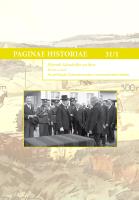Od voleb 1920 ke vzniku Pětky
From the 1920 Elections to the Origin of Pětka
Author(s): Peter PopálenýSubject(s): History, Political history, Interwar Period (1920 - 1939)
Published by: Národní archiv
Keywords: political parties; parliamentary elections; political crisis
Summary/Abstract: Based on the peace conditions stipulated by the Versailles Treaty, Czechoslovakia was confronted with a wide array of crisis situations during the first years of its existence. The First Czechoslovak Republic was a multinational state which caused many problems, especially when the members of these ethnic groups often did not identify themselves with the independent republic. Taking into account the economic and social issues as well as many disputes with the neighbouring states, the initial situation in Czechoslovakia was very complicated. However, it was crucial for future development to find out whether and how the new state’s representatives would deal with critical moments.The first elections to the Chamber of Deputies of the National Assembly of the Czechoslovak Republic in 1920 definitively confirmed the democratic path on which Czechoslovakia embarked after its establishment in 1918. Despite great efforts, the elections did not take place throughout the Czechoslovak territory due to plebiscites that were under way, and in Carpathian Ruthenia, the elections were postponed to 1924. Social democrats were clear winners of the elections, although this success did not mark the end of the nationwide crisis or the crisis inside the party. The newly assembled government did not last long. Its fundamental destabilising element was the increasing dissension among the social democratic party members.As a consequence, the elections were inconclusive and could not bring a quick end to the crisis, but they were tangible evidence of the distribution of power in society and, in many aspects, the catalyst of the internal political situation. The solution in the form of a caretaker government produced a plethora of polemics and doubts whether such a government could be associated with democratic principles and constitutionality. The government based its legitimacy on gaining trust for the Chamber of Deputies and on support of the political parties forming the majority in the parliament. Executive power was stabilised, but further stabilisation was endangered by the escalating dispute in the social democratic party provoked by the adherents of the communist – Bolshevik ideology. The President, one of the crucial stabilisation elements in society, became ill at the beginning of 1921 which caused further instability. In this situation, the rather unique Pětka (Five) grouping of five state-forming ‘Czechoslovak’ political parties was established. The grouping had a majority in parliament and substantially influenced (not only) the political milieu. It was instrumental in the entire state’s stabilisation, but it was also an object of criticism for its non-institutional status. Little by little, Czechoslovakia overcame all of the crises and became a successful democratic country in post-war Europe.
Journal: Paginae Historiae
- Issue Year: 31/2023
- Issue No: 1
- Page Range: 79-96
- Page Count: 18
- Language: Czech

